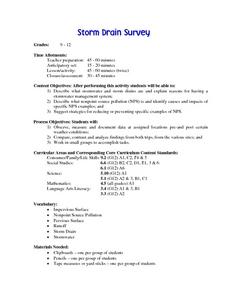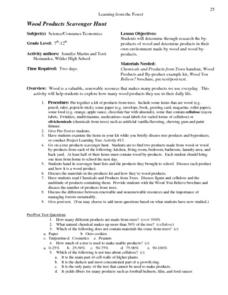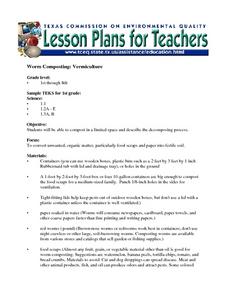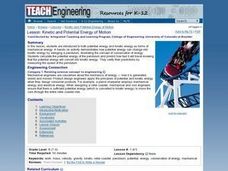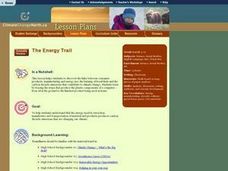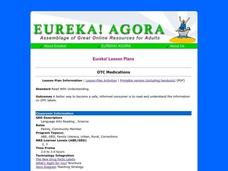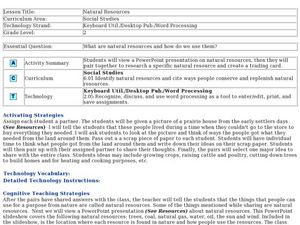Curated OER
Mushroom Prints
Learners create a mushroom spore design on paper while studying the facts on fungi.
Curated OER
Farming 2: Packaging and Transport
Students explore the special packaging and transport that many foods require to stay fresh during their journey from the farm to people's dinner tables.
Curated OER
Enzymes
Tenth graders observe enzyme activity. They discuss the relationship between drug use and enzyme activity.
Curated OER
Keeping Milk Fresh
Young scholars identify the risks of spoilage and pathogens in fresh milk. They investigate the farmer's role in keeping milk safe to drink and identify safety procedures used in dairy farming.
Curated OER
Food Safety at the Grocery Store
Students study the connection between food spoilage and temperature control. They determine the difference between expiration, sell-by, and use by date on food. They investigate food safety practices to look for when food shopping.
Curated OER
Farming 1: Farm Machines
Students examine how machines help people grow food. They study specialized types of farm machines and the tasks they perform. They complete handouts matching images of the machines with text.
Curated OER
Circle of Life
Students consider why we eat and where our food obtains its energy. They illustrate food chains that might be found on an open field, dissect owl pellets, identify the remains of animals in the pellets, watch videos and participate in...
Curated OER
Storm Drain Survey
Students describe what stormwater and storm drains are. They explain reasons for having stormwater management system. They describe nonpoint source pollution and identify causes and impacts of it.
Curated OER
Wood Products Scavenger Hunt
Young scholars investigate the by-products of wood and explore the wood products in their own environment. Products containing both cellulose and silvichemicals obtained from the trees are examined in this lesson.
Curated OER
Don't Use it All Up
Students observe the way that a sponge absorbs liquids and discuss how we our use of natural resources affects the environment around us. They discuss the need to conserve resources so we don't run out of what we need.
Curated OER
Worm Composting: Vermiculture
Students set up their own composting bin. They observe and record their findings during a period of time. They describe the decomposing process as well.
Curated OER
Oil and Gas As A Source of Energy
Students discuss the reasons why oil and gas are the United States' main source of energy. In groups, they use the internet to research how the resources are formed and the amount of consumption by the United States. They choose books...
Curated OER
TE Lesson: Kinetic and Potential Energy of Motion
Learners investigate the difference between potential and kinetic energy. They examine the formulae associated with both types of energy. They complete how quickly a pendulum with swing by converting potential energy into kinetic energy.
Curated OER
The Energy Trail
Students examine the relationship between the products they use and energy use. Using the internet, they identify the role that manufacturing plays in using energy and the emissions that change the climate. They discover the steps to...
Curated OER
A Day on a Farm
Young scholars discuss their morning as they prepared to come to school. The teacher guides the discussion so students understand ways they relied on agriculture to accomplish tasks. Young scholars view pictures of various farm...
Curated OER
Will There be Enough Water?
Students investigate water usage, water available, and water demand historically in the local area. They use projections of water usage, availability and demand up to the year 2050. Students use graphs to relate as well as compare and...
Curated OER
Minerals and You
Students study how mineral are used in everything around us-- from cereal to satellites. After informing the students about minerals they will discuss the ones that are in the area of the students.
Curated OER
My Biotic Creation
Eighth graders explore different ecosystems. In this ecosystem survival lesson conditions lesson students create their own fictional creature.
Curated OER
Where Did The Electricity Go?
Ninth graders identify problems and research potential solutions regarding the efficiency of energy use. They examine the potential problems associated with the use of electrical appliances. They brainstorm about practical problems...
Curated OER
OTC Medications
Students become aware of better ways to read and analyze the information provided on OTC labels. This concept is accompanied with the integration of technology, brochures and a Venn Diagram for illustration. They assess medical...
Curated OER
Natural Resources
Fifth graders begin the lesson plan by identifying the different types of natural resources. As a class, they discuss how environments are destructed and how the loss of one natural resource can affect the economy. Using a map, they...
Curated OER
Using The Old Bean
In this agriculture worksheet, students take a multiple choice exam that focuses on the use of beans in different aspects of agriculture and society.
Curated OER
Scientific Notation
In this scientific notation worksheet, students review how to write a number in scientific notation and then how to write a number in standard notation. Then students complete 5 problems.
Curated OER
Let's Make a Tubeworm!
Students discuss deep-sea chemosynthetic communities then create a poster of a three-dimensional tubeworm. In this creative lesson students create their own tubeworm and write a written report on it.
Other popular searches
- Family and Consumer Sciences
- Family & Consumer Sciences
- Food and Consumer Sciences
- Family Consumer Sciences
- Family Ans Consumer Sciences
- Consumer Sciences "Clothing"
- Consumer Sciences Clothing
- Consumer Sciences "Clothing




